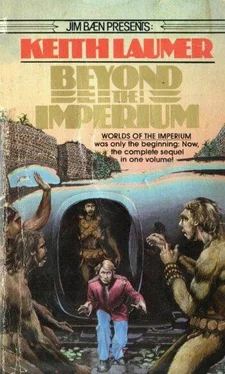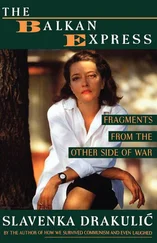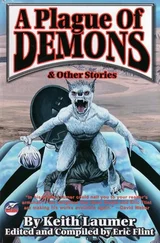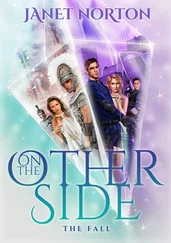“Our destination appears to be the Royal Archives,” he said. “It’s just ahead.”
The side street faced a wall of foliage that had been a park. On our side, there was a monumental facade, festooned with ragged vines. Some of the windows still had glass in them, but most of them were blind, like eyes afflicted with green cataracts. Where the door had been, there was a gap in the screen of vines.
“Something’s been using that entrance,” I said. “Something the size of a rhinoceros.”
“Still—that’s where we must go,” Roosevelt said, and pushed through a screen of limp, yellow-spotted leaves the size of garrison flags. There was a path through the mat of moss on the floor, where tiles showed. We followed it fifty feet to a dead end. Roosevelt unshipped a handlight and played it over a wall of impacted vines.
“We’ll have to cut through.” He changed the torch setting, and the beam dimmed to deep red, sliced through the tangled growth. In half a minute he had cut a hole big enough to climb through.
He clipped the torch to his belt and went ahead. I started after him, and heard a rumble like a Bengal tiger disturbed at his nap. I came through fast, grabbing for my gun, and saw moonlight on low walls, black lawn, a fountain with water. Roosevelt was backed against the carved Neptune, facing something right out of the fairytale books. It had a long, feline body, a maned neck, a beak like an eagle—if eagles had beaks two feet long. The legs were scaled from the midpoint down and ended in talons like the big claw in a wrecking yard. It was a griffin, half lion and half eagle, and both halves were closing in for the kill.
I yelled and fired high to distract the thing. It reared up and danced around on its hind legs to face me, showing an expanse of snow-white underbody and giving me a good look down the red throat behind the beak. The eyes were the size of Dixie cups, three concentric circles around yellow irises. The outer circle was scales—iridescent silver ones. Darker scales ran back across the face and ended where the white mane began. A pointed black tongue licked out like a snake between the halves of the knife-edged beak. I saw all this in a couple of fast seconds while I backed away and wondered just what Roosevelt would call an extremity.
“Hold your fire!” he called. “It’s tame!” I started to ask him what his idea of wild was, when I saw what he meant. There was a harness strapped around the thing’s chest, almost hidden under the mane. Silver ornaments dangled from the black leather, jingled as it moved. It dropped down to all fours less than ten feet from me, gave a scream that ended in a yowl, and sat down on its haunches. Its timing was good; in another half second I’d have blown its chest open. Which would have been a serious mistake, because just then the owner came walking out of the shadows.
I’d gaped pretty hard at the snake-dog, and the griffin had held my attention, too; but neither of them was anything at all to what I saw now.
It was a girl: tall, high-bosomed, long-legged, with skin as white as the fallen marble columns, and dark copper hair piled up high over a face that was like the one you dream about, that smiles and is lost forever, and you wake up sick with yearning. She was dressed in a flimsy swath of white gauzy stuff that clung to her hips and thighs like wet tissue paper and floated when she moved. She came straight up to the thing that had me cornered and said, “Aroint thee, Vrodelix! An ill greeting for visitors!” It dropped its head and whined like an overgrown puppy.
The girl pushed the monster aside and looked at me. Her eyes were dark blue, and they glistened in the moonlight. I knew those eyes; I’d seen them in the dream.
“Are you a man?” she said. “Or a god?” Her tone indicated that both choices were equally likely. I told her and she nodded.
“I’m glad. I am a mortal woman.” She looked across at Roosevelt, who had come up to us. He gave her a courtly bow and the smile.
“But you are a god,” she said.
“Only a man, my dear,” he said. “Pieter Roosevelt, at your service—and this is Richard Curlon.”
She smiled up at him, and I felt a strange feeling that somehow I’d missed out on something rare and valuable.
“And I am Ironel, Pieter,” she said.
“You live here alone?” Roosevelt was asking.
“Oh, no. Vrodelix is with me.” She ran a hand along the sleek, curved neck of the nightmare animal. “And I have other friends—and now, two new ones!” She caught Roosevelt’s hand and then mine and smiled from one to the other of us, and we grinned back.
“Tell me about your other, ah, friends, Ironel,” Roosevelt said in the gentle, fatherly tone he had adopted with her.
“Of course, Pieter! There is Ronizpel the Climber, and Chazz the Dweller Below, and Arnq of the Spines—and many more!”
“All animals?”
She had to think that one over. “Mostly,” she said. “Except for Chazz—I think. But you’ll meet them soon. Oh, how glad they’ll be you’ve come!” She stopped, as if she had just remembered something. “But Old Garff—I’m not sure he‘ll be pleased.”
“How long have you lived here?” Roosevelt wanted to know.
“Why—forever.” She sounded surprised at the silly question.
“Where are your parents?”
“What are parents?”
“The people who raised you—taught you to speak, to dress yourself so prettily?”
“Why… ’tis a novel thought, Pieter! Must one learn to talk as I taught Arnq to weave his nets o’er the Dark Places?” She touched the soft fold of the cloth she wore. “As for my garment—’tis made for me by Arnq, of course.” She looked at Roosevelt’s nylon suit, touched my sleeve. “I must show him your weaver’s work; ’twill set him a task, to make stuff like it.” She laughed, pleased by the idea.
“Are there no other people here—like you, and us?” Roosevelt persisted.
“But—we are not like!” Ironel laughed. “You are taller than I, and your hair is short, and your shoulders wide and your chest flat—not like me.” She touched her body, ran her hand down her slim waist as if to sense the differences with her fingertips.
“We’re men,” Roosevelt said, smiling faintly. “You’re a woman. Are there other humans of either sex here?”
That seemed to puzzle her. “No, none,” she said.
“What do you eat? How do you keep warm in winter?”
“Why—Chazz brings me roots from the deep earth, and Ronizpel knows where the grapes and melons ripen soonest. And when the whiteness falls, I dwell indoors, and Arnq swathes the windows with his finest weaving to hold back the cold.”
Vrodelix whined, and while the girl was soothing him, Roosevelt stepped close to me.
“Are we to believe this poor natural maid lives all alone here as she says? Is it possible?”
“It looks that way. For some reason the Blight seems to stay clear of this little patch of ground. You said it was the eye of the storm. The eye of a hurricane is a dead calm.”
Ironel was back beside us, smiling. “Come,” she said. “Now I’ll show thee my playthings!” She towed us across a flagstone walk between tended flowerbeds where black and gold fungus blossoms grew between roses and daisies. We went through an archway and across a tiled hall and up stairs into a wide, shadowy corridor that was blocked twenty feet away by fallen masonry; but the part that was clear was swept clean. She opened a door on a room with a deep black carpet and high, glassless windows with curtains of the same gauzy stuff as her clothing. There was a high bed with a white silk canopy over it, decorated with a floral design in gold thread. She knelt by a big chest with a carved lid and opened it and lifted out a bolt of scarlet cloth.
Читать дальше












